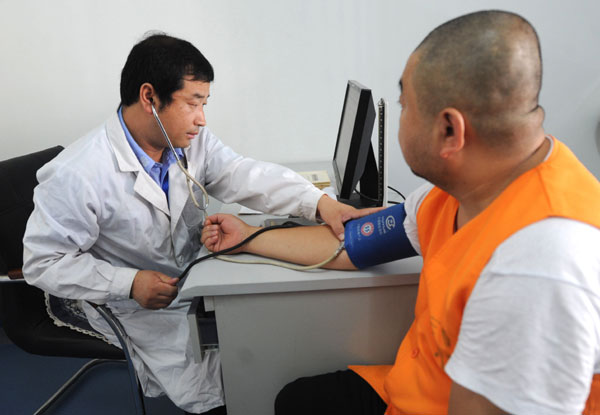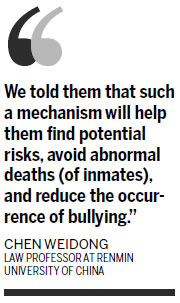Mechanism protects prisoners and helps reduce risks of getting bullied
China will expand a trial program that allows inmates in detention centers to complain about police wrongdoing, in what experts call a step forward in protecting inmates' rights.
The move came after a series of scandals involving detention centers in recent years triggered public outrage.
 |
|
A doctor conducts a checkup for an inmate in Sanhe, Hebei province, in July. Li Xiaoguo / Xinhua |
Prosecution and public security authorities in Wuhu, the second-largest city in East China's Anhui province, established a mechanism in March 2011 for inmates at the city's detention center to file complaints about their conditions at the center to authorities.
According to the Detention Center Regulation, which was issued by the State Council in 1990, a detention center is a facility for people under criminal detention or who have been arrested and are awaiting court hearings. It can also confine convicted people who are given sentences of less than one year or who have less than one year of their sentences left.
The measure is an initial trial for a detention-center complaints initiative supervised by the Supreme People's Procuratorate and the Ministry of Public Security. Chen Weidong, a professor in criminal procedure law at Renmin University of China and also director of the university's research center for lawsuit system and executive reform, said the trial aims to explore new methods of curbing investigators' abuse of inmates and safeguarding inmates' rights.
Chen said the trial has proved a remarkable success, and it will be expanded to detention centers in four other places - Wuzhong in the Ningxia Hui autonomous region, Beilun district of Ningbo in Zhejiang province and Anhui province's Wuhu and Nanling counties - in October.
In the next phase, the trial will focus more on preventing illegal collection of evidence, including officers' torturing inmates for confessions, he added.
Chen's center launched the initiative in 2006 and conducted some preliminary field research in Northeast China's Jilin province that year.
|
 |
After Wuhu city was chosen by central authorities in August 2010 for the trial, the center helped city authorities draft a regulation to stipulate procedures of receiving and handling inmates' complaints.
Under the regulation, detainees can file a complaint when an infringement on their civil rights, living conditions or litigation rights occurs. Complaints against police officers at the detention center will be submitted to and dealt with by center heads, and prosecutors at the center will also be informed about the complaints. Complaints about other inmates will be handled by the center's police officers.
Moreover, detainees can seek prosecutors' help when they have problems with investigators in charge of the cases who are suspected of being involved.
The regulation also permits inmates to meet resident prosecutors anytime during the latter's working hours.
Each inmate has been given a brochure explaining his or her obligations and rights at the center, and the center authority is determined to make sure their complaints are properly addressed, center heads said.
As of May, inmates in the detention center had filed 73 written complaints, according to the city's prosecution authority.
The center usually keeps around 500 inmates.
Nearly two-thirds of the complaints were about living conditions like "bad" food and missing belongings that had been kept by center authorities, according to a document released by the Anhui Provincial People's Procuratorate and Anhui Provincial Public Security Department.
The mechanism "has achieved satisfactory effects", said the document, adding it has been effectively protecting inmates' legal rights and eliminating police officers' misbehavior such as physically punishing inmates or verbally insulting them.
"It has also prevented investigators from torturing suspects to get their confessions."
